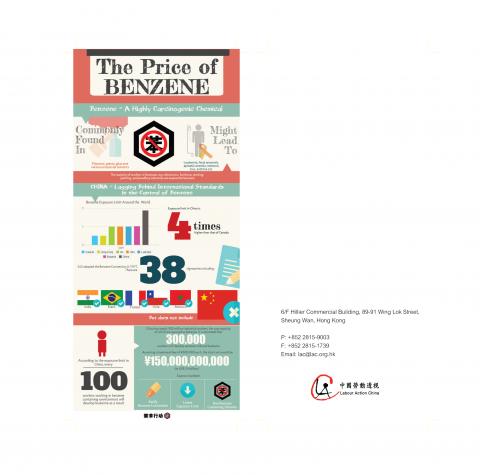
Ban Benzene Campaign is our latest advocacy on the issue of occupational safety and health. Chemical poisoning has become the second largest cause of occupational diseases in China. The vast majority cases of the chemical poisoning are related to a carcinogenic chemical called benzene. Benzene-containing solvents are widely used in electronics, footwear, toy and other industries. Although benezene-free alternatives are available, the cost of using benzene-containing solvents in manufacturing processes remains inexpensive. On the other hand, the actual price is borne by the workers themselves and other society.
This campaign was first launched in China last July. A declaration was drafted and has attracted more than 50 signatories. The declaration is calling on: (1) companies and brands to replace with benzene-free alternatives in their supply chain; and (2) the Chinese Government to legislate against the industrial use of benzene with limited exemptions and to sign the ILO Benzene Convention (C136).
Meanwhile, "the use of chemicals at work" was the theme set by the ILO for this year's World Day for Safety and Health at Work (28 April). In conjunction, we released a report titled Toxic Chemicals Killing Chinese Workers: a critical analysis and case studies of benzene poisoning in China, as well as a bite-sized leaflet. We decided to take this campaign to Europe. An expert meeting was convened on 29 April in Amsterdam with the support of FNV and Good Electronics. This meeting was well attended. NOS, a Dutch national broadcaster, reported this event on their prime time evening news - Giftige stoffen in Chinese elektronicafabrieken (news) and Stop benzeen in fabrieken China (featured article).
Prior to this meeting, our delegation attended and participated into the World Day for Safety and Health at Work commemorative events organised by FNV.
Other than our work in the Netherlands, our delegation was also interviewed by Le Courrier, a Swiss newspaper, while attending the review on China's implementation of the ICESCR by the UN Committee on Economic, Social and Cultural Rights. This article is titled La Chine dans l'enfer industriel (in French).
